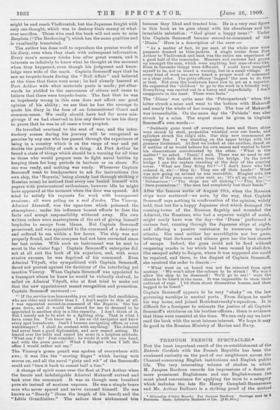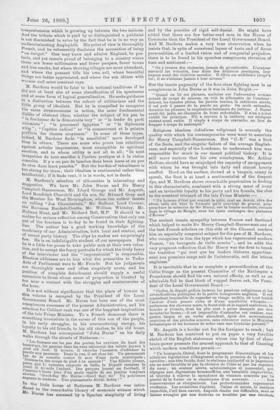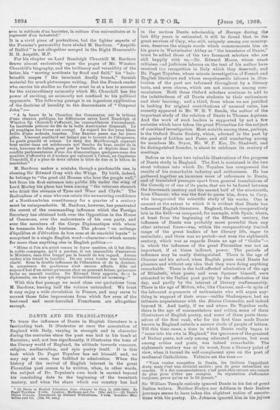THROUGH FRENCH SPECTACLES.* NOT the laaat important result of the
re-establishment of the Entente Cordiale with the French Republic has been the awakened curiosity on the part of our neighbours across the Channel concerning English institutions and English public life. The very interesting volume of studies in which M. Jacques Bardoux records his impressions of a dozen or more prominent Englishmen and one Englishwoman (we must plead convenience for applying the term to a category which includes the late Sir Henry Campbell-Bannerman and Mr. Arthur Belem') is a striking proof of the mutual
• Silhouettes trOutre Manche. Par Jnoquos Bardoui: Ouvrage orni ao I Portraits. Paris: Libirairie Hachette of Cie, [3 tr. 60 0.]
comprehension which is growing up between the two nation's. And the tribute which is paid by so distinguished a publicist is not diminished in value by the fact that he is in no way an undiscriminating Anglophile. His point of view is thoroughly French, and he vehemently disclaims the accusation of being "un émigré." One may know and admire England, he pro- tests, and yet remain proud of belonging to a country where
there are fewer millionaires and fewer paupers, fewer towns and less smoke, but where thriving villages are more abundant, and where the peasant tills his own- soil, where beautiful things are better appreciated, and where the sun shines with warmer and more constant 'rays.
M. Bardoux would be false to his national traditions if he did not at least aim at some classification of his specimens and at some form Of logical generalisation. He seeks guidance in a distinction between the cohort of utilitarians and the little group of idealists. But be is compelled to recognise the same strenuousness in action, the same fundamental dislike of abstract idezis, whether the subject of his pen be
" be fondateur de la democratie tory " or "le leader du parti
unionist° " ; "le proconsul egyptien " or " le diplomats
1'44 " ; " l'apotre radical" or "le commercant et be peintre Plef6rei des 'classes moyennes." In some of these types, indeed, M. Bardoux finds "la sensibilite" more developed
than in others. There are some who prove less rebellious against artistic impressions, More susceptible to spiritual emotion, and to whom utility is not all in all; " its sent incapables de tout sacrifier A notion pratique et A la vision concrete. 11 y a un pen de lumibre dans leura Ames et tin pen de rho dans leuris pensees." But the burden of inheritance is too strong for them ; their idealism is sentimental rather than intellectual; if it finds vent, it is in words, not in deeds.
Bardoux's selection of silhouettes is interesting and Suggestive. We have Mr. John Burns and Sir Henry
Campbell-Bannerman, Mr. Lloyd George and Mr. Asquith,
Lord Randolph Churchill and his son, Sir Edward Grey and the MOmber for West Biriningham, whom the author insists
i°,11 calling "Joe Chamberlain," AV. Balfour, Lord Cromer, the Baroness Burdett-Coutts, Mr. William Whiteley, Mr.
Holman Hunt, and Mr. Richard Bell, M.P. It should be a matter for serious reflection among Conservatives that only one out of the fourteen is to-day to be found in their fighting- line- The author has a good working knowledge of the machinery of our. Administration, both local and central, and of recent party history. The slips he makes are surprisingly few. He is an indefatigable student of our newspapers. But he is a little too prone to take public men at their own valua- tion, and to accept the fancy portraits for which the lively fancy of the interviewer and the " impressionist " is responsible. Election addresses are to him what the preambles to Tudor Acts of Parliament were to Mr. Froude. But his judgments are thoroughly sane and often singularly acute, and his Position of complete detachment should supply a useful corrective to those whose sense of proportion is blunted by too near a contact with the struggles and controversies of the boar, It is not without significance that the place of honour in this volume is occupied by the President of the Local Government Board. Mr. Burns has been one of the most conspicuous successes of the present Administration, and his selection for Cabinet rank was one of the happiest inspirations of the late Prime Minister. To a French democrat there is something irresistible in the career of this son of the people, in his early struggles, in his overmastering energy, his loyalty to his old friends, to his old clothes, to his old home. M. Bardoux has accompanied "John Burns" on his daily walks through the streets of Battersea :—
."Les females sur les pas des portes, les ouvriors du haut des tramways, les gamins dens lea rues adrossont des salute joyous good old Jack. II trouvo, ii chorche l'ocoasion d'adresser la parole aux peasants. Dans is rue, it est chez lui. Un garnement bat do la smell° centre In mur -d'une 6cole municipal° ; onnes-ti des coups do pied it to maison P ' Um) fillette pleure, jvure ou 13 ruisseatt emporte sa ballo, he Depute ramasse le e.aas6 .ot eaasole l'onfant. Des garcons jouent au football, alert:el.° k. lours jeux d'un goats rapid() 'do seat jambes toujours `Good-day Mr. Burns.—Good day; sir.' Un policeman 4trPonte trettoir. Uno plaisauterie deride Bobby ! " ilk the house at Battersea M. Bardoux was intro- duced to the. remarkable library of economic science which Bnrns has amassed by a Spartan simplicity of living
and by the practice of rigid self-denial. He might have added that there are few better-read men in the House of Commons than the President of the Local Government Board. And M. Bardoux makes a very true observation when lie insists that, in spite of occasional lapses of taste and of fierce personalities, of a limited vision and of congenital prejudice, there is to be found in his speeches conspicuous elevation of tone and sentiment :-
" On y trouve des violences, jamais do grossieretes. L'orateur surexcit lee, volontes, lour diets des decisions pratiques, lour impose aussi des victoiree morales. Il &eve see auditeurs jusqu'h lui; ii no ?abates°. jamais b, lour niveau."
But the innate pugnacity of the first-class fighting man is as conspicuous in John Burns as it wa,slu John Bright :—
" Quand on lit ces phrases, aesenees sur l'adversaire comma autant do coups do ;neatene, on voit la silhouette do l'oratour : debout, les epaules pliees, les jarrets tendus, la mitchoire serree, ii est prat it passer de In parole an pate. On croit- entendre, dernilre les phrases, la respiration haletauto du lutteur. J. Duras await et& jadis, un champion do bore redoute.ble. Il n'en a point oublie les principes. S'il a rocours it la raiUorie, sus attaques rostent aussi rides. Il &oleo it coups do cravache, an lieu do frappor it coups de matraquo."
Religious idealism (idealisms religieuse) is scarcely the quality with which his contemporaries were wont to associate Sir Henry Campbell-Bannerman. But "C.-B." was a Scot of the Scots, and the singular failure of the average English- man, and especially of the Londoner, to understand him was responsible for much in our recent politiCal history. It is still more curious that his own countryman, Mr. Arthur Balfour, should have so misjudged the capacity of an opponent with whom he was brought into daily and almost, hourly conflict. Hard on the surface, shrewd at a bargain, canny in speech, the Scot is at heart a sentimentalist of the deepest dye, and M. Bardoux shows remarkable penetration in finding in this characteristic, combined with a strong .sense of the and an invincible loyalty to his party and his friends, the clue to the eventual triumph of the late Prime Minister :—
" ITn homme d'etat qui connut la piti6, °rut an dovoir, rave dos raves, tell: est biou hx formulo convient do graver, pour porpetuer la memoir° de Sir Henry, Bur la tomb° modi3sto; arouses dans he village do Meigle, sous lea epais ombrages dos plateaux d'Eeosse."
The ancient innate sympathy between France and Scotland which helped to make Sir Henry Campbell-Bannerman one of the best French scholars on this side of the Channel renders him an especially congenial subject for the pen of M. Bardoux, who recognises in Lim the type which has regenerated modern France, " un bourgeois de vielle Bombe" ; and he adds the
very pregnant reflection that Sir Henry was the first to break the tradition "qui vent qua les leaders liberaux appartien-
nent aux premiers range soit de l'aristocratie, soit dee lettres anglaisee."
It is inevitable that in so complete a personification of the Celtic fringe as the present Chancellor of the Exchequer a Frenchman should find his own natural affinity, as well as an admirable foil to that block of rugged Saxon oak, the Presi- dent of the Local Government Board :—
" Cortes, le depute gallois inearno los passions religieuses et les revondications politiques de la petite bourgeoisie anglaise. Ii est cependant impossible de regarder on visage mobilo, oh tout trahit l'arcleur d'une pousee riche et d'une sensibilite vibrabto :— audessons des cheveux noire, le front ride of he regard nialicieux, la boucho si vivant°, dont lea plis sent it peine masques par une moustache brine ;—il est impossible d'entendre cat orateur, aux gestes larges at au vorbo abondant, epris des mouvements oratoires et dos periodos senores, sans rotrouver entre in Ministre britaunique et les hommes do notro race uno lointaine parente."
Mr. Asquith is a harder nut for the foreigner to ()rack ; but M. Bardoux has contrived to put on paper a very forcible sketch of the English statesman whose rise by dint of steer brain-power presents the nearest approach to that of Canning which modern conditions permit :— " Un bourgeois liberal; dont le programme democratique et les solutions legislatives s'elargissent sous la pression do la pouss3n ouvriere ; uue tote froide, dont he realism° instinctif et he jugement sflr ne sent troubles'ni par la chimer° de ride° ni par.les caprices du war ; un orateur alerts, aristooratique et concentre, qni repugue aux. digressions boursoufileos, aux banaliteS improvisees, et cherche it relever In monotonie de resumes , concrete pari'laa
puret6 de la forme ou le classicisme d'un souvenir, te conservateurs so reorganisent. Les proteetionnistes reprennept confiance. Lea socialistes s'agitent. Calme et serein, lo masque immobile, l'o3ilbien.ouvert,. Aequith 6tudie cos diffloultes, Sans se laisser avougler par une doctrine ou troubler par um' emotion. aveo Is method° d'un barrister, In culture d'un universitaire et le, jugement d'un industrial."
It is a vivid piece of portraiture, but the lighter aspects of the Premier's personality have eluded M. Bardoux. "Asquith of Balliol" is not altogether merged in the Right Honourable H. H. Asquith, M.P.
For his chapter on Lord Randolph Churchill M. Bardoux draws almost exclusively upon the pages of Mr. Winston Churchill's biography, and the brilliancy and versatility of the latter, his "moving accidents by flood and field," his "hair- breadth napes the imminent deadly breach," furnish material for much picturesque writing. But the French reader who carries his studies no further must be at a loss to account for the extraordinary animosity which Mr. Churchill has the power of exciting, an animosity not confined to his political opponents. The following passage is an ingenious application of the doctrine of heredity to the descendants of " Corporal John":—
" A Ia barre de in Cbambre des Communes, sur Is tr6teau d'une reunion publique, les differences entre Lord Randolph et Winston Sp. Churchill s'effacent, lea ressemblances s'accentuent. La lassitude precoce du file de in belle Americaine disparaft. Le pli sceptique des levres est corrige. Le regard las des yeux bleus brille d'une ardente lumiere. Erne flamme passe our lea joues pales. L'accent nasillard est balaye par le torrent de reloquence. Le geste grandit at anime. Le sang des Marlborough roparalt tout antler dana cat aristocrats qui fauche du bras, excite de in voix, heureux de luttes, grise par in bataille, at &pink) dana les conflits parlementaires d'une re democratique, quelques-unes des qualites d'offensive et d'audace qui valurent to redeul, au Capitaine Churchill, it y a plus de deux sidles le titre de duo et Is baton de mareehal."
M. Bardoux makes a mistake, though a pardonable one, in classing Sir Edward Grey with the Whigs. By birth, indeed,
be belongs to "the good old Houses who love the people well," but from his first entrance into public life under the wing of Lord Morley his place has been among " the veterans staunch
who drink the streams of Tyne and Wear and Clyde." The Radicalism of a man who can retain the unwavering confidence of a Northumbrian constituency for a quarter of a century must be unimpeachable. M. Bardoux, however, has penetrated the secret of the commanding influence which the Foreign secretary has obtained both over the Opposition in the House of Commons, over the malcontents of his own party, and over the members of the Corps Diplomatique with whom be transacts his daily business. The phrase " un mélange d'equilibre et d'elevation de bon sena et de sincerite loyale " is comprised in a, single English word—character—which counts for more than anything. else in English politics :-
"Memo si l'on n'a,point connu le foyer austere, oil it fut env°, in noble compagne, qu'il a perdue, it eat impossible d'entrevoir le Ministre, sans etre frappe par la beaute de son regard. Aueun ombre teen ternit in lumiero. De ces yeux tombe une lointaine dart& Sous la double influence de reducation et de la douleur, la conscience du gentleman s'oat encore affinee. Elle est aujourd'hui d'un metal qu'auoun choc ne pourrait briser, qu'aucune tache ne saurait rouiller. Sir Edward Grey apporte, dais in un ame qui repugne invinciblement an monsonv."
With this fine passage we must close our quotations from M. Bardoux, leaving half the volume untouched. We trust it may enjoy a wide circulation in France, and may serve to correct those false impressions from which few even of the best-read and most-travelled Frenchmen are altogether exempt.




























































 Previous page
Previous page